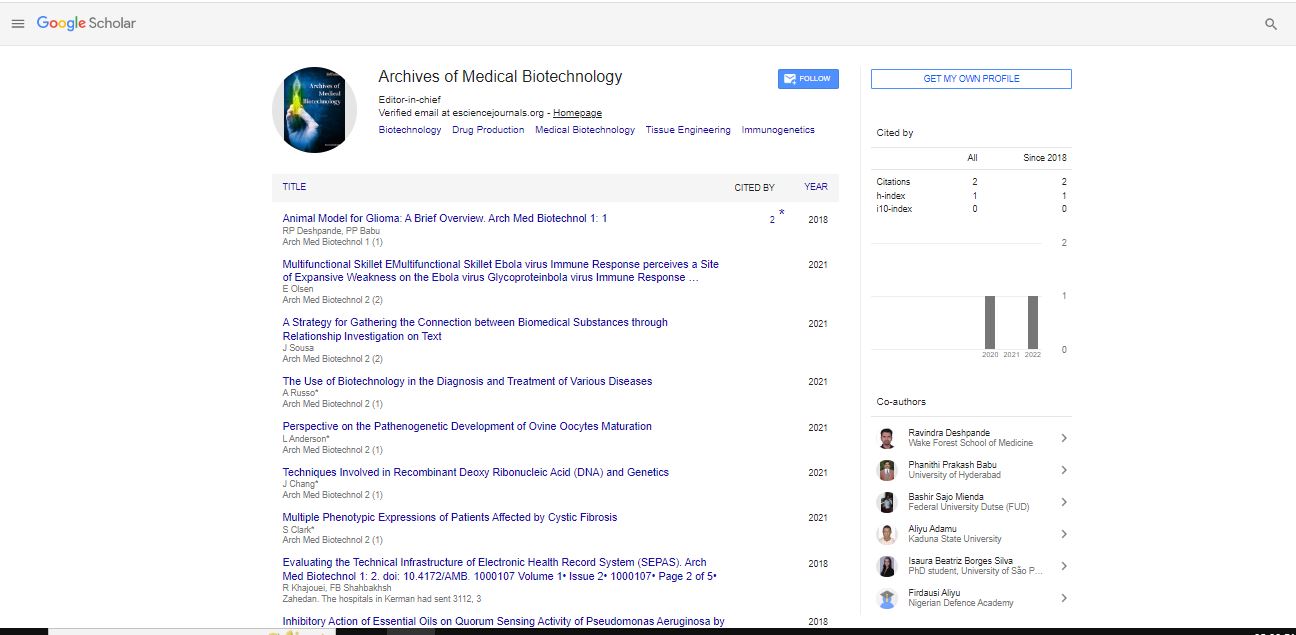Opinion Article, Arch Med Biotechnol Vol: 4 Issue: 3
The Role of Medical Biotechnology in Transforming Medicine and Revolutionizing Healthcare
Jungwook Park*
1Department of Chemical Engineering, University of Diponegoro, Semarang, Indonesia
*Corresponding Author: Jungwook Park,
Department of Chemical Engineering,
University of Diponegoro, Semarang, Indonesia
E-mail: parkj57@gmail.com
Received date: 30 August, 2023, Manuscript No. AMB-23-117776;
Editor assigned date: 01 September, 2023, PreQC No. AMB-23-117776 (PQ);
Reviewed date: 15 September, 2023, QC No. AMB-23-117776;
Revised date: 22 September, 2023, Manuscript No. AMB-23-117776 (R);
Published date: 02 October, 2023, DOI: 10.4172/amb.1000051
Citation: Park J (2023) The Role of Medical Biotechnology in Transforming Medicine and Revolutionizing Healthcare. Arch Med Biotechnol 4:3.
Description
Medical biotechnology is at the forefront of a healthcare revolution, with the potential to transform the way we diagnose, treat, and prevent diseases. This interdisciplinary field, which merges biology, chemistry, genetics, and engineering, is at the heart of Innovative discoveries and innovations in the medical world. In this article, we will explore the fascinating world of medical biotechnology, its diverse applications, and the significant impact it has on healthcare and human well-being.
Understanding medical biotechnology
Medical biotechnology is a branch of biotechnology that applies biological and chemical techniques to create innovative tools and techniques for the diagnosis, treatment, and prevention of diseases. It encompasses a wide range of applications, including genomics, gene therapy, pharmacogenomics, and tissue engineering. Let's delve into some of these applications.
Genomics and personalized medicine
One of the most profound contributions of medical biotechnology is in the field of genomics. The Human Genome Project, completed in 2003, marked a significant milestone by mapping the entire human genome. This monumental achievement has paved the way for personalized medicine, where treatment plans are tailored to an individual's unique genetic makeup. Medical biotechnology allows us to identify genetic markers associated with disease susceptibility and drug response, enabling more effective treatments with fewer side effects.
Gene therapy
Gene therapy, a subset of medical biotechnology, has the potential to treat genetic disorders at their source. It involves introducing, altering, or repairing genes within a patient's cells to correct genetic mutations. Diseases like cystic fibrosis, sickle cell anaemia, and certain types of blindness are being targeted for gene therapy research.
As technology advances, gene therapy holds great promise in curing previously untreatable conditions.
Pharmacogenomics
Pharmacogenomics is a field that uses genetic information to optimize drug therapy. By understanding how an individual's genetics affect their response to medications, doctors can prescribe drugs with higher efficacy and fewer side effects. Medical biotechnology allows for the development of tailored drug regimens, minimizing the "trial and error" approach often associated with drug treatments.
Tissue engineering
In the realm of regenerative medicine, medical biotechnology plays a pivotal role in tissue engineering. This exciting field involves creating functional tissues and organs in the laboratory, often using a patient's own cells. These engineered tissues can be used for transplantation, reducing the dependence on organ donors and the risk of rejection. From artificial skin to lab-grown organs, tissue engineering has the potential to revolutionize transplantation and wound healing.
Diagnostic advancements
Medical biotechnology has also brought about Innovative advancements in diagnostic tools. Rapid and accurate diagnostic tests have become indispensable, especially in the context of the ongoing global health challenges. Polymerase Chain Reaction (PCR) technology, for instance, is pivotal in the identification of infectious diseases like COVID-19. Molecular diagnostic techniques have made it possible to detect diseases in their early stages, leading to more effective treatment and prevention strategies.
Biopharmaceuticals
The production of biopharmaceuticals, such as insulin, monoclonal antibodies, and vaccines, relies heavily on medical biotechnology. These products are engineered using living cells and genetic manipulation, resulting in highly effective and targeted treatments for a wide range of diseases. Biopharmaceuticals have transformed the treatment landscape for conditions like cancer, autoimmune diseases, and infectious diseases.
Challenges and ethical considerations
While medical biotechnology offers immense promise, it also presents significant challenges and ethical dilemmas. Issues like genetic privacy, accessibility to emerging and noble treatments, and the potential misuse of genetic information require careful consideration and regulation. Balancing the rapid pace of innovation with ethical concerns is an ongoing debate in the field of medical biotechnology.
Conclusion
Medical biotechnology is revolutionizing healthcare, providing new avenues for diagnosing, treating, and preventing diseases. From personalized medicine to gene therapy, diagnostic advancements, and the production of biopharmaceuticals, the impact of this field is undeniable. As we continue to unlock the potential of medical biotechnology, it is crucial to ensure that ethical guidelines and regulations keep pace with innovation, promoting responsible and equitable use of these emerging technologies for the benefit of all. The future of medicine is being shaped by medical biotechnology, promising a healthier and more personalized approach to healthcare.
 Spanish
Spanish  Chinese
Chinese  Russian
Russian  German
German  French
French  Japanese
Japanese  Portuguese
Portuguese  Hindi
Hindi 